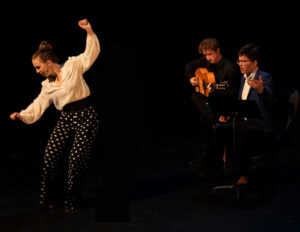Dark Sounds is a series of flamenco literary performances by the members of Palabra Flamenco and poets Garth Martens and Jan Zwicky. In this unusual way of reinventing the flamenco tradition, two poets perform with a dancer and a guitarist who improvise and respond to the English-language poetry and storytelling. They dive into themes of family, love, sex, and the collective sorrows of our culture and planet, such as the climate crisis.
“If you think of jazz as being improvisational in chordal structures, flamenco is improvisational in rhythm,” says Martens, who is also the Dark Sounds producer. “No one knows necessarily what’s going to happen, and the rhythm may change. There are signals that the dancer might give that the guitarist would pick up.”
Martens says that there’s a hierarchy within the inner structure of the flamenco performance.

“Everyone follows the singer—there’s a respect for the words and the singing. But they will share the steering wheel in that sense,” he says. “There are moments where we give control to the dancer, and everyone attends to that.”
Palmas, the clapping accompaniment present in some flamenco, is a rhythmic support, allowing the dancer to dance on the off beats as the palmero provides the underlying rhythmic architecture.
“The clapper is never in charge,” says Martens. “The palmero is always serving the communal effort. But also, rhythm is the most important law—you can do anything, but just stay in rhythm, or compás.”
Martens and the other members of Palabra Flamenco—guitarist Gareth Owen and dancer Denise Yeo—started working together as a group in 2017, performing at the Victoria Flamenco Festival. They went on to play at the Victoria Fringe Festival and Vancouver Fringe Festival in 2018. Martens invited Jan Zwicky to join them in their first Dark Sounds performance through the Victoria Flamenco Festival in 2018, and after its success, they performed Dark Sounds again in 2019. After several more performances, they’re now booking for 2025.
“The experience just got richer every time,” says Martens. “With flamenco, it’s about improvisation—structure and improvisation.”
In flamenco, it’s common that the audience is just as much involved in the show as the performers.
“It’s about relationship—even the audience shouting jaleo, or words of encouragement—olé, agua, hassa. Even their breathing is a part of our show.”
Martens has found that the post-performance conversation, which is led by therapist and writer Melanie Siebert, can be intense yet moving.
“I’ve seen a lot of counsellors, therapists, social workers, even death dulas coming out here,” he says. “The resulting interview conversation has at times been so charged and has gone for over an hour. We’ve had people come out sobbing and gripping Jan’s sleeve because they’re still working out their response to the conversation.”
This kind of conversation only really works in smaller spaces that are able to foster this intimate atmosphere.
“We’re interested in reality, intimacy,” says Martens. “It would be way easier for us to go into a bigger theatre, but we’re in a 45-person theatre—everyone is close enough to hear the dancer’s ragged breath after she’s really exerted herself, and [she’s] probably gonna drop sweat on them if they’re in the front row.”
The result is that the close and gripping performances pull on all emotions, unearthing the dark and the light.
“It is grim and dark, but somehow it’s still fun,” says Martens. “Flamenco is so suited to despair, persecution, hardship, as well as joy, lightness, mockery. Unlike a lot of popular Western art forms, it goes through the floor into uncomfortable emotions, letting us put on faces. In other art forms, we’d be wanting to make it nice. Well, these are the faces we’re often told not to wear—flamenco wants those faces front and centre… People can look so beautiful making the ugliest faces.”
Dark Sounds
7 pm Thursday, November 7
7 pm Friday, November 8
7 pm Saturday, November 9
Various prices, Intrepid Theatre
intrepidtheatre.com
